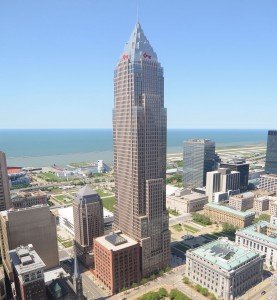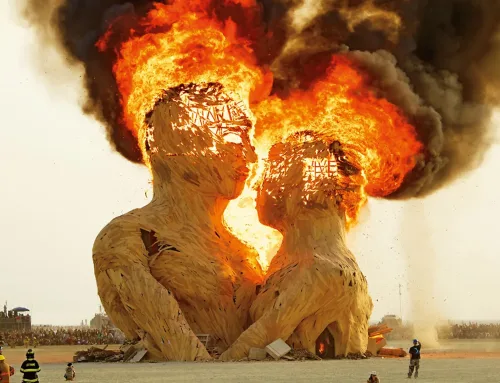By Ryan Collins
I was born in northeast Ohio, on the awkward border between green and brown farmland and the gray highways crisscrossing Ohio’s suburbia. It wasn’t exactly Amish country, but buggies did clip-clop down the road every so often.
My parents put down roots in two and a half acres outside Wooster. This wasn’t suburban or even exurban flight, but rural flight. It’s almost ridiculous how idyllic and bubble-like my childhood was there, and I didn’t realize it until years later in college when new classmates and friends told stories of mythical Tower City, seemingly gold-plated sidewalks of Beachwood, and rough and tumble stories of the east side (as described by west-siders, of course).
From the road, our house was framed on either side by a white picket fence, with tall trees on either side of the gravel driveway. We had a pine grove, and those trees always covered me in sap when I climbed them. In the garden, my dad planted carrots, corn, and pumpkins. During the summer, evening breezes would blow through our open windows, and my dad listened to baseball games on the radio in our kitchen. It’s hard even for me to believe this was the 90s, not the 50s.
[blocktext align=”left”]I never had an inkling I could actually live in a city. My place was in the treehouse out back.[/blocktext]
I sometimes looked at faded images of cities in the old books around the house, almost all of them library discards purchased for a quarter. But I never had an inkling I could actually live in a city. My place was in the treehouse out back. A marketer today might describe it as, a second-story getaway with a view! I dubbed it simply as my reading room.
My childhood bubble was punctured when a friend told me of the visits he had made to Cleveland, accompanying his dad to Browns games at Municipal Stadium. My bookish and dreaming brain had him tuned out by the time he mentioned football. The city was a real place, and I was determined to go there. How to convince my family to take me into the city? I had no idea where to start, let alone what to do there.
+++
Proving the universe has a dark sense of humor, I was homeschooled after first grade. The yellow bus I once took chugged by our driveway without a second thought. The first year I stopped going to the little brick elementary school up the road, I wondered if they would at least check on me. (They didn’t.)
In a bout of passive-aggressive defiance at any kind of authority keeping me in check (as practiced by a seven-year-old), I hid my last class photo underneath a loose, mossy brick on the floor of our musty shed. There were plenty of places I could have hidden the photo in the house, but I chose the shed. No one ever found it. Though I cherished the photo, I didn’t want to see my friends and their smiling faces because they were together, and I was missing out.
My isolation turned me into a little library gnome. I begged my mom to take me to the local branch every day, until I had read almost the entire children’s section. Any news from outside the four walls of home was delicious to me, be it from books or through the monstrously large library computer. I perked up every time the dial-up connection loaded a map of a destination I had no way of visiting. Windows 95 and Netscape were my saviors, laboriously loading photos of faraway places, some of them made up. I didn’t care if I looked at Minneapolis or Minas Tirith.
Though I didn’t know the symbolism yet, my budding escapism meant my favorite reading was Calvin and Hobbes. The boy and his tiger lived life as an adventure, exploring the woods, getting really dirty, hating school all the while. I loved school — even at home — for the most part, but I identified with Calvin and his lust for the unknown. I knew every pebble in our backyard, how the rain made a stream down our hillside, how a neighbor’s daffodils poked through the sagging, wooden fence, how the snow never got inside our red dog house that smelled like straw. I even knew where my world ended: At the forlorn Methodist church perched at the end of the road. Like Calvin, I kept to myself, but it wasn’t really a choice.
Back then, I had no clue Bill Watterson was from northeast Ohio, but I can see it now in his work. Parks and green space are everywhere around here, and Calvin’s world was no different. He charged into the bush after school and didn’t come back until dinner. Of course, everyone sees themselves in someone else’s art, but Calvin’s world and mine really did seem to be one and the same. I devoured every single strip of that comic.
+++
 I only knew Cleveland, the capital of northeast Ohio, as the city where our three grainy TV channels came from, as they reported on murders and other serious crimes. Although we lived only 70 miles away, the drive to the city seemed to take hours. But when my family had to grudgingly visit, I watched in awe every time as downtown’s skyline glided into view. Even Akron’s skyline was fantastical when the highest structures I’d seen were windmills. Though I had seen plenty of other cities on the computer, I had no sense of scale and wondered if ‘that red key building,’ as I called it then, was highest in the world.
I only knew Cleveland, the capital of northeast Ohio, as the city where our three grainy TV channels came from, as they reported on murders and other serious crimes. Although we lived only 70 miles away, the drive to the city seemed to take hours. But when my family had to grudgingly visit, I watched in awe every time as downtown’s skyline glided into view. Even Akron’s skyline was fantastical when the highest structures I’d seen were windmills. Though I had seen plenty of other cities on the computer, I had no sense of scale and wondered if ‘that red key building,’ as I called it then, was highest in the world.
At the red key’s foot and of those other tall buildings in Cleveland and Akron, so I was told by church matrons and nosy neighbors alike, lay lawless streets unsafe for anyone. My country road, conversely, was safe, if you didn’t mind dodging buggies or tar bubbles born from the summer sun. I didn’t care about their tales of woe. In my mind, people who went downtown got to see art, brushed shoulders with luminaries, and were a very accepting bunch. To a little boy who hadn’t quite figured out he was gay, downtown was the place to be. Considering I thought the standard 9 to 5 crowd was cool, imagine if I had seen a pride festival on one of those cherished visits into town. No matter if I was seven, eleven, or fourteen, I would have metaphorically exploded with glee.
[blocktext align=”left”]Sometimes I laid in bed at night, praying I would one day get to see those bustling streets all the time …[/blocktext]
Sometimes I laid in bed at night, praying I would one day get to see those bustling streets all the time, watching the skyscrapers and their winking lights. Cleveland may be part of the ailing Rust Belt, but to a little boy far from any highway, let alone a city, Cleveland was the epitome of big. Cleveland meant sparkling lights and towers reaching to the sky. It meant people who did glamorous things, not just buggies that led my dog on a chase from one end of my yard to another.
Whenever we began the long drive home on I-71 or I-77, I’d scramble to look back. The skyline never disappeared in my mind’s eye, not once, though it faded from view as highways led to little routes to country roads to home.
As I braked my blue bicycle at the Methodist church yet again, its steeple reminded me of Key Tower reaching into the sky. If my little road led to a highway, I knew I could become a Clevelander, because that’s where I didn’t need my mind’s eye, nor a brick to hide reminders of what I was missing. It was the only big city I’d ever known, but even now – having long tossed off the sheltered act – I can’t help but love the place. Back then, I knew a cosmopolitan life was my future, and anything outside city limits was the past. Sure, I dreamed of New York, Paris and San Francisco like every other Midwestern kid, but there’s still something I can’t shake about Key Tower and Terminal Tower. They remind me of hope and sturdy foundations I would never, ever want to hide my prized possessions underneath. Why would I? I’m not missing out anymore.
Ryan Collins is a Cleveland-based writer and a graduate of Kent State University.
Do you like what we do here at Belt? Consider becoming a member, so we can keep delivering the stories that matter to you. Our supporters get discounts on our books and merch, and access to exclusive deals with our partners. Belt is a locally-owned small business, and relies on the support of people like you. Thanks for reading!







So much of this reminds me of my childhood as well. I grew up outside of Ravenna and was always intrigued with distant places and, of course, Cleveland.